
Teaching Philosophy

Poetry club rehearsal, 2018/2019

Details matter

Graduation for Jerrel, who I taught from 10th through 12th grade
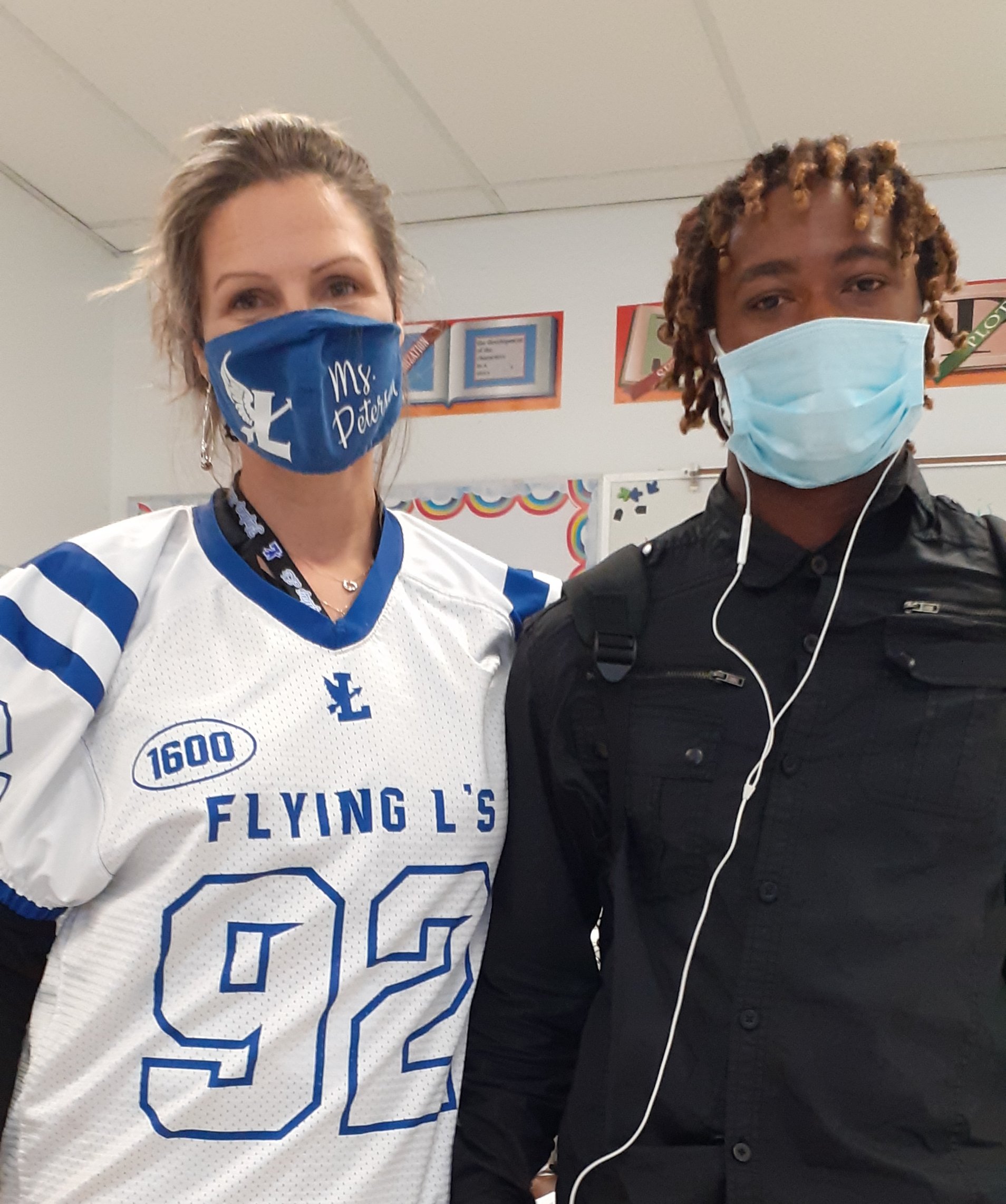
Awarded the honor of wearing Jerrel's football jersey for the day.

A selfie with Adam, to send to his favorite teacher who'd moved out of state.

Teachers need their tea! (Not a metaphor).

Moving to online learning, 2020

The start of the 2021 school year with online learning.

SEL learning: consent

Joke of the day, 2019-2020. And student artwork.

The best kind of compliment.

"I will try" lesson: students' pledges to make a start on their hopes, dreams, and goals.

Classroom painting! With help from my daughter.

Superlative from my student poetry club, Write the Waves

That time we made the school newspaper, for all the right reasons.

It's always sad when a student leaves mid-year.

Write the Waves at the 2019 Louder Than a Bomb quarter-final, Savor cinema.

Write the Waves at the 2019 Louder Than a Bomb semi-final, Nova Southeastern University.
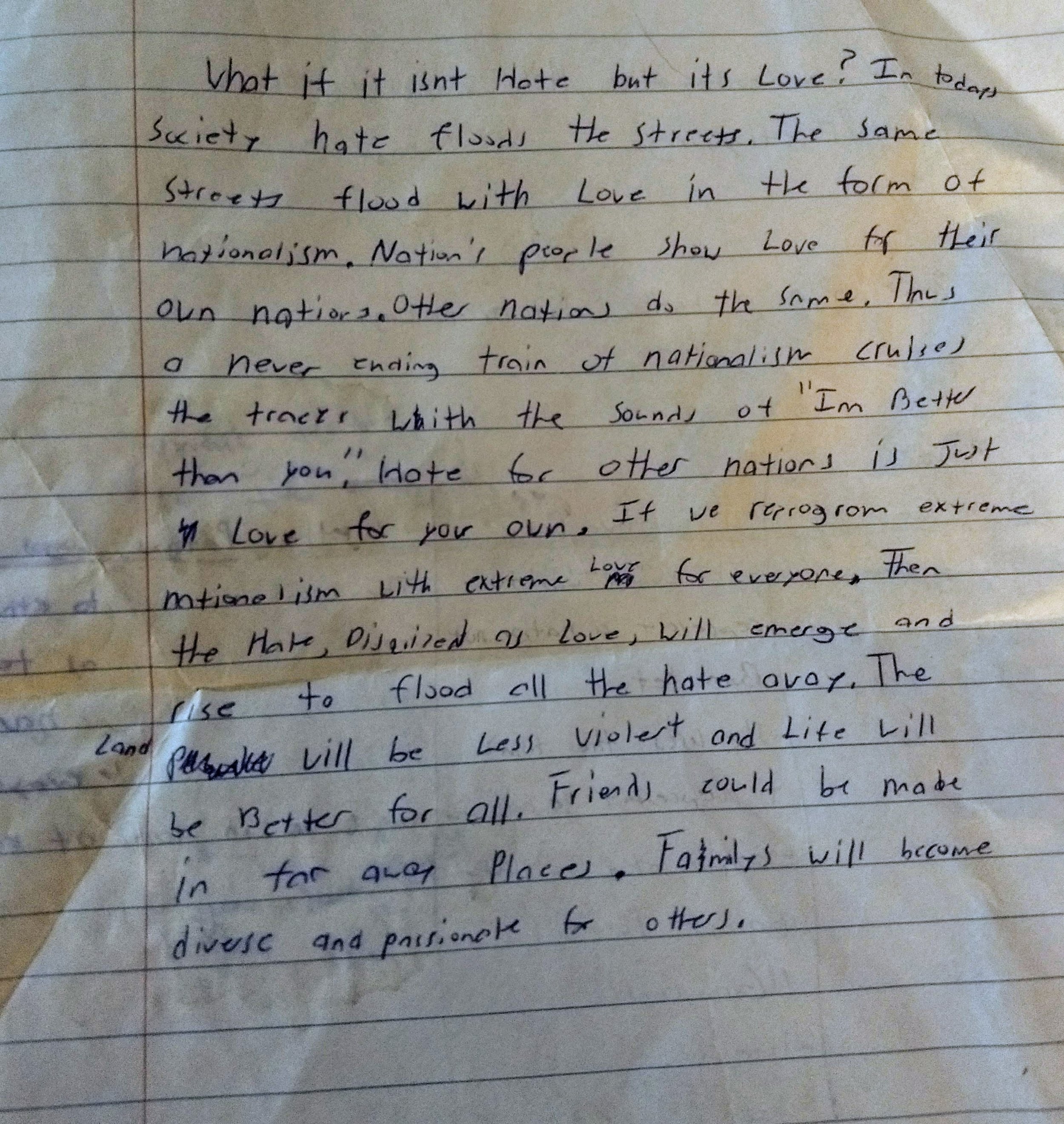
Student writing inspired by Valarie Kaur's watch night speech, https://www.today.com/video/what-if-this-is-not-the-darkness-of-the-tomb-but-the-darkness-of-the-womb-watch-valarie-kaur-s-speech-917892675740

Gallery walk and peer review of projects with my 11th-grade honors ELA students, 2019-2020
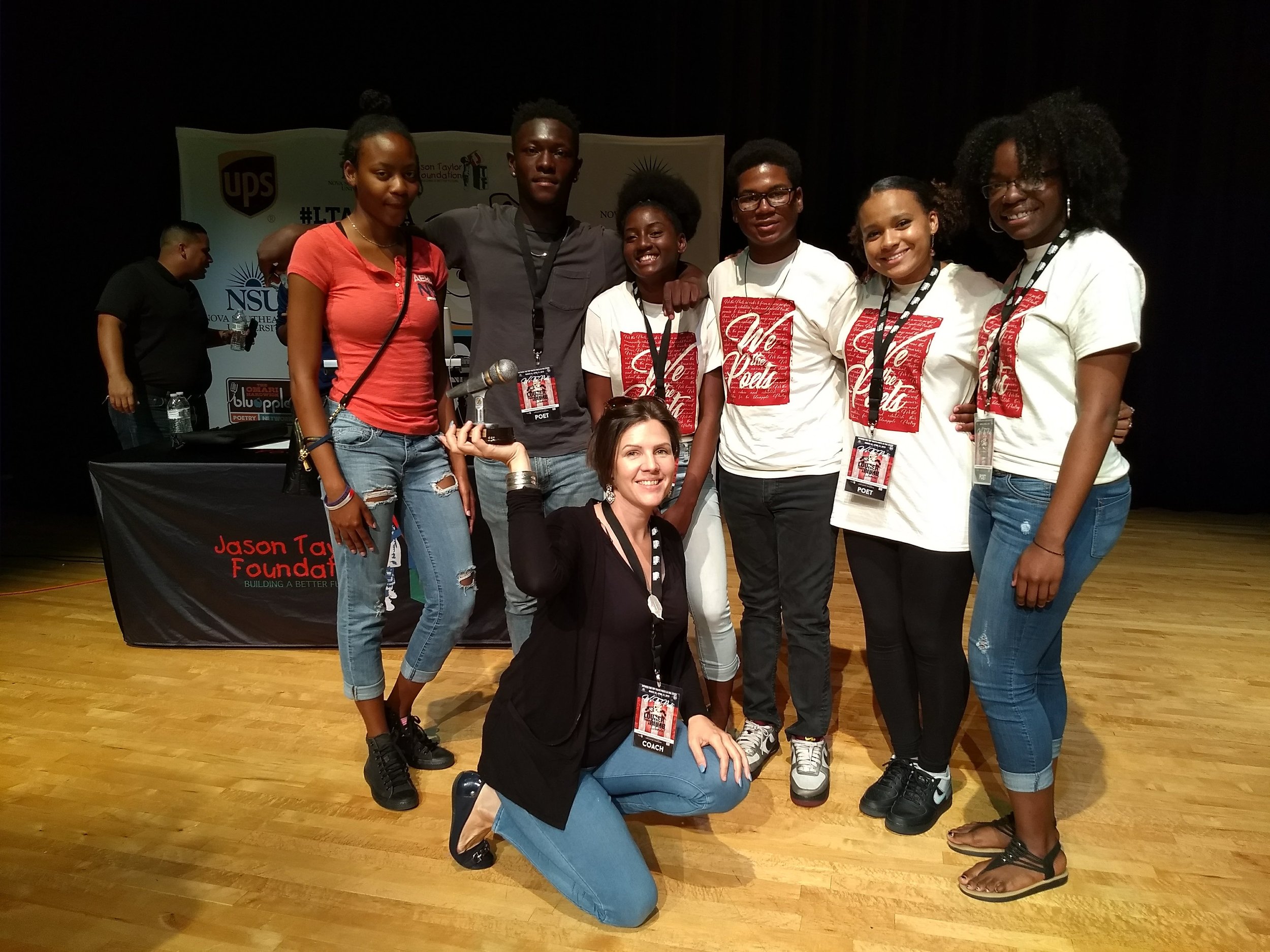
Semi-finalist runners up! T-shirts and a trophy! Write the Waves at Louder Than a Bomb 2019.
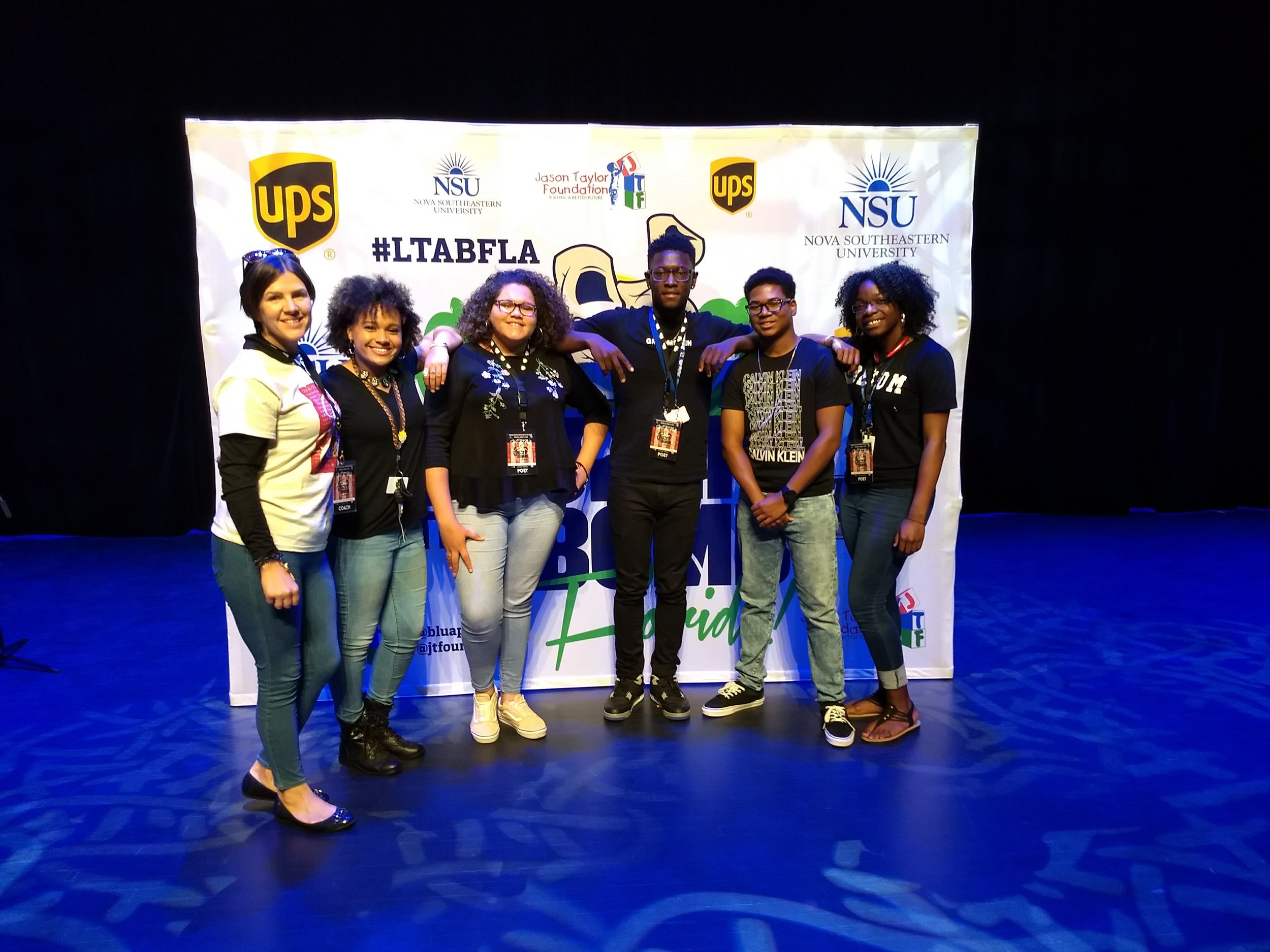
More 2019 quarter-finals.

Yes, the whiteboard is for instructions, but also for happy notes and reminders.
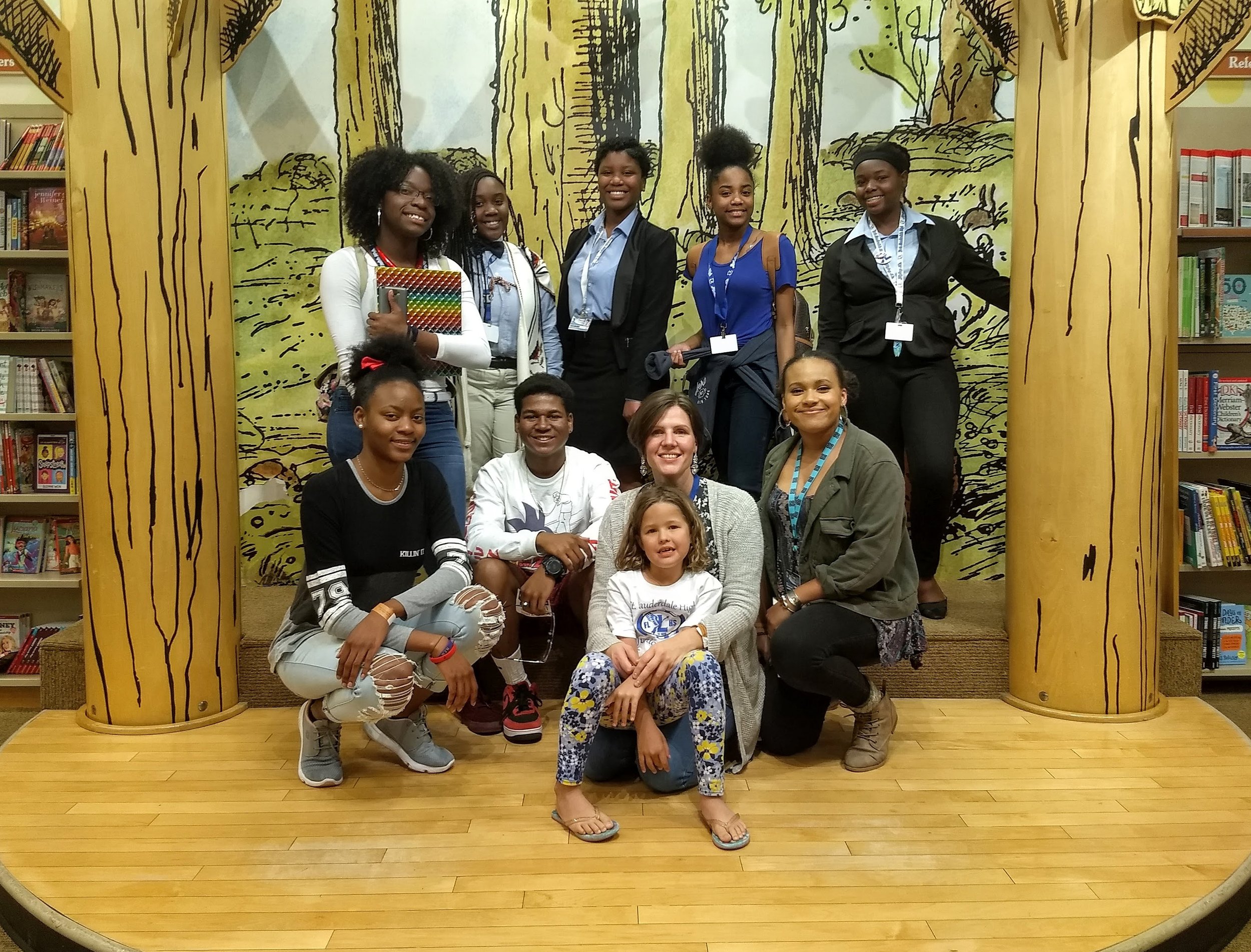
When we knocked it out the park with our spoken word event at Barnes and Noble, for the Fort Lauderdale High School evening.
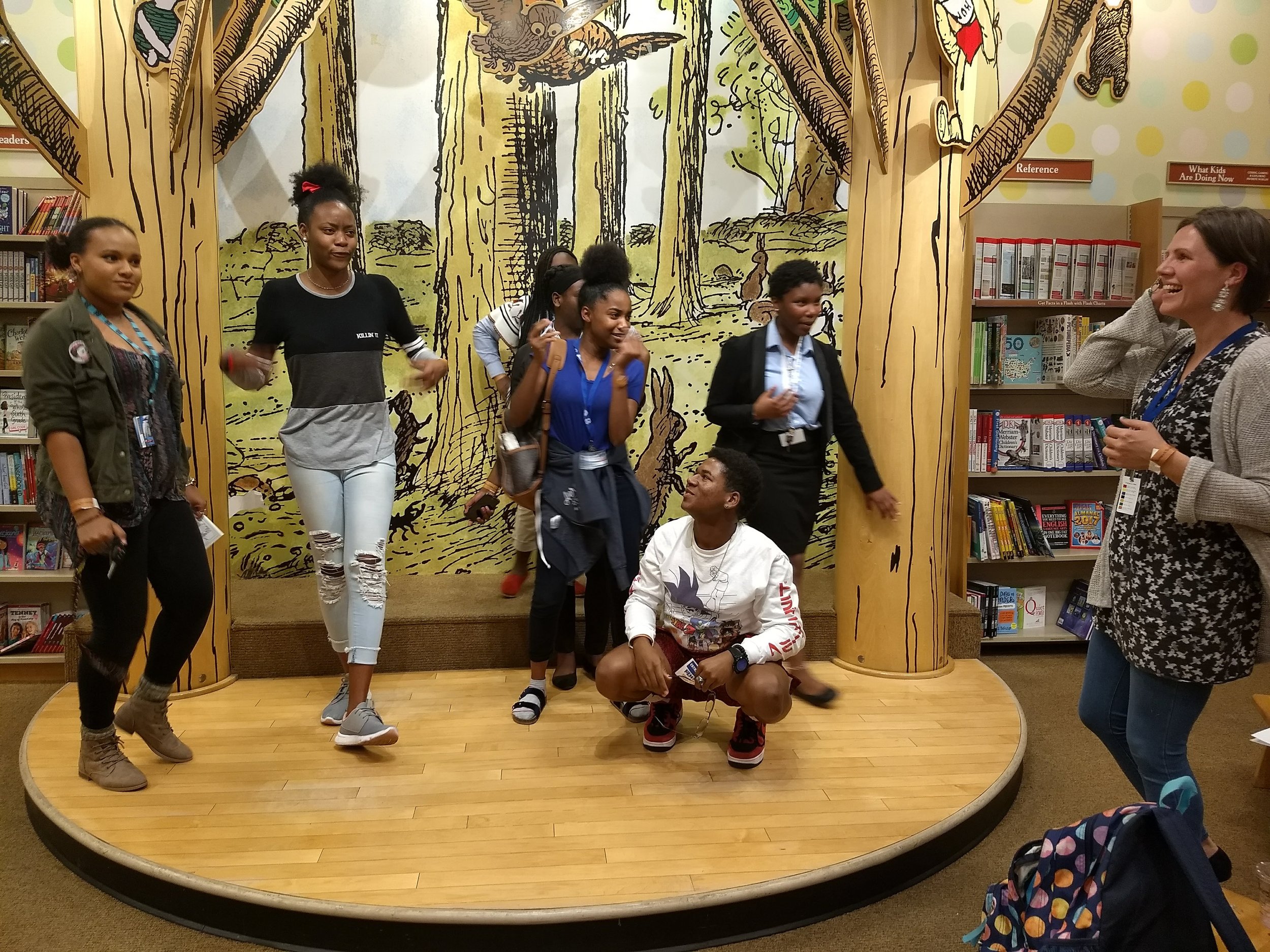
Just being our wonderful selves

Appreciating other poets at Louder Than a Bomb.

Service hours to support Broward UPS workers, many of whom donate to the Jason Taylor Foundation, which supports local Bluapple poetry programming.

Dear Ms. Ashwas,
Who will you be to my students? Who have I been? Perhaps you are in a better position to answer this; five years ago, you were my student. And now I am handing my classes over to you, after the start of this school year.
Perhaps it’s better to start with my classroom than to start with me. My classroom, now yours, is painted an idealistic sky-blue, because I learned that place matters, that community matters. It’s the kind of sky over English fields on an emerging summer’s day, with fluffy clouds, a large, melting rainbow, and tiny birdmen dotted around the walls. These details were painted by one of my most artistic students, the blue background was painted by a team of eight or ten students who volunteered to come in one summer before school started. They were paid in service hours and pizza; we had the best time, and I still look back at the photos from that week.
I learned that diversity matters, so my classroom has posters with quotes from Cesar Chavez, Rumi, Booker T. Washington, and Maya Angelou. I remember the Hispanic student who thanked me for having Chavez prominently displayed. I remember the student who struggled so much in her writing but was determined to become the first Bahamian-born, high-ranking judge in the US. She asked me for the Booker T. Washington poster to take home at the end of the year.
I learned that representation matters, from a student expressing her delight that I had stickers of Black mermaids on one wall, years before The Little Mermaid remake.
I learned that my patience matters. At the end of my first, exhausting year teaching, having fought with them all year, my most difficult students sat down to write their final. One of them, a leader, said loudly, “We’ve got you, Miss.” Then they all put their heads down and worked without complaint.
I learned that empathy matters, in all directions. Another student, who would barely sit down during the class, who would actively disrupt others, on one occasion gently told me, with a concerned expression, that I looked tired.
I learned that the small, daily acts can sometimes mean the most, from a 12th-grade student who was late to class almost every day. I asked her every day how she was doing, and every day she said “terrible”, so I would respond, automatically, that I hoped they would improve. She wrote her college essay about me, and I learned that even my ingrained responses had been more kindness than she had expected and that an unrelated award I had recommended her for was the first and only award she ever received in her school career.
These are the moments that I carry—no, these are the moments that have carried me for the past eight years. These are the moments that remind me of what it is to teach.
We don’t get to start the story, just as you are jumping into my role mid-year, and we almost never get to know the outcome. We don’t get to check in on their college or work career, we don’t know if they made it through. We get a moment, only. We get the messy middle. Although I’m not sure anything is truly tidy in teaching. Except my classroom on the first and last days of school.
If, as a teacher, I am a farmer, then my classroom is an organic farm which is being reclaimed from the ruinous impacts of standardized testing, generational poverty, institutionalized racism, and toxic literacy. So, my work can’t start with seeding, because the land is so uneven, it is not ready yet. This is the lie of teaching, that students arrive fresh each year, whereas it’s more like taking over a new farm; I need to first learn about the history before I can effectively guide its future. My first job is to survey the fields. Some will have stones scattered on them, some will have been fed and cared for with just the right amount of time to lie fallow over the summer, some will have been deprived of nutrients. In this case, I must draw alongside the farm and learn what has already been working, or not working, to help each part of it to grow and flourish in its own way. What’s important to remember, though, is that there should always be hedgerows and fields of wildflowers, these are not a cash crop, or even a crop, but without flowers, the pollinators are fewer, and the yield is poorer. And because we need to experience beauty in our lives. Wildflowers or weeds? A weed is a flower whose value has not yet been recognized (Friere, Royster, Taczak, Yancey, Bizzell).
In this farming metaphor, the student role may seem very passive. The only options for them seem to be to grow or to fail, to be nurtured, to be harvested. Perhaps the student body is more like a forest. In a wooded area, contrary to prior belief, trees do not compete for resources, they share them. They pass along nutrients to each other. The forester doesn’t control their growth but instead ensures the best environment to assist that growth (Ong: Writing is a technology that transforms thought)
Maybe my classroom is a whole ecosystem? Farms can also contain managed forests. And, in case you haven’t experienced this already, you will soon, sometimes it can feel like a classroom is a whole uncontrollable wildfire of emotions and personalities.
As a farmer or a forester, I am a guide. I can’t make something grow simply by telling it to. This, too, I have learned. But what I can do is create the optimal environment for it to grow, through the right amounts of praise and criticism, commenting and signposting. Some crops need more resources than others, some will bloom wherever they are planted, others will need careful tending (Bizzell: Student context is important, Elbow: Assessment v ranking).
Did you know that plants benefit from being spoken to kindly? I have heard of gardeners that talk to their plants. I don’t know if farmers talk to their crops; the numbers would be overwhelming. It seems impossible to reach every seedling. But if the environment could be created where kindness is rewarded, perhaps the crops can respond by speaking kindly to each other (Elbow, Murray, Yancey).
To me, all of the students in my writing classroom are writers. All of them can be writers. Some are far more emergent than others. Most are hopeful, while a few this year appear to lack any hope of being able to write much more than a few sentences at a time.
So, what can we teach them? We can teach them that they are valued, we can show them that their thoughts matter, and we can help them to see that those thoughts, expressed on paper, bring an intrinsic reward of realized achievement, and a smile, and an encouraging word (Murray: Writing as a process). And, a lot of the time, the extrinsic reward of stickers. Through writing, we can teach development (Ong). Development of thinking, expressed through writing which leads to a transfer of writing ability throughout other subjects and mediums. We can teach them how to have fun with words and writing. We can teach them that their voice is important. We can teach them that writing is a skill, that everyone can learn about writing and practice different ways of writing. We can teach them that essays are not the only fruit, that wildflowers are not weeds (Friere).
We can offer lots of formative practice, so that our students can produce flowers and fruits of all kinds, and we will treat each carefully and respectfully (Friere). We can give them daily opportunities for free thinking, written reflection (Fulkerson, Hairston, Bruffee: students benefit from small-group discussion and reviewing) We can offer humor, and we can admit our mistakes and laugh at ourselves. An expressivist and social-epistemological pedagogy matters, because we—and our students—are humans first (Berlin, Friere).
So, with the benefit of hindsight, please allow me to offer my mistakes to advise your praxis:
I have learned that helping students learn about the process and development of writing is more important than the writing product. As a new teacher, I saw the writing product as more important than the student, with unhelpful verbal imperatives like “just write!” when they struggled to get started.
I have learned how important it is for students to know they are liked and safe. Why would they want to spend time and energy in a place where they don’t feel valued?
I have learned to ask questions more than I offer statements. This offers opportunities to learn about your students, to get to know them and their challenges. It is not enough to tell a student “Stay awake in class”; it is better to gently inquire, “Are you okay? Did you get enough sleep last night?”
I have learned not to sweat the small stuff, like punctuation and grammar. They matter, but not until later, and not as much as ideas. Focusing too much on conventions can have students believing that they can’t write. The most important thing is to help students learn that they are all writers, and they can all make progress in their writing.
I have learned that my family, my time, my physical and mental health all matter. It took the pandemic to realize I could—and should—create a life-work balance. My students do not need me to work 20 hours outside the school week for them, and I am a better teacher during class time if I am healthy, fit, well-fed, and well-rested.
Your students don’t have to fall in love with writing, although that would be nice, but be aware that many of them may hate it. Focus on offering creative outlets, place emphasis on getting to know them, and let them make choices in the work. ALL writing is important. If they hate an assignment, ask them to write about why they hate it. Or draw, if that’s their thing. Help them find a way to express themselves, maybe in comparison to their favorite video game (Shipka).
Avoid setting homework. If you must, for students to complete class work, allow at least one study hall day so they can complete it using school resources. Students may not even have a desk or quiet area at home.
Give a catch-up class every month or so. Have an alternative extra credit optional assignment for anyone who is all caught up or offer they can use it to catch up with work from other classes. You will also need this catch-up class!
Daily writing for 10-30 minutes at the start of every class, ideally. Students may work on their own writing or choose a prompt from the board.
Every time they write something substantive, have them a) grade their own work according to a rubric, and b) give themselves a narrative grade to explain their reasoning, their choice of form, audience, tone, what went well and what went wrong. This helps them improve more quickly as it engages reflection and metacognition about how they are writing, as well as what that are writing.
Your job is to help your students become original and interesting thinkers, and for them to be able to explore and express ideas and thoughts through writing. This will help them in all other areas of life, as well as with end-of-year exams, but it won’t necessarily come easily.
To support this, try the following:
Use prompts that ask about their thoughts, feelings, reactions, connections as opposed to just “identify the main idea”. More like “what is your response to this author’s argument?”
Poetry. Especially funny or controversial poetry. Read it, play with it, help them to find a poem that resonates with them, help them to write a poem that resonates with others.
Read and love their work.
Give a catch-up class every month or so. Have an alternative extra credit optional assignment for anyone who is all caught up or offer they can use it to catch up with work from other classes. You will also need this catch-up class!
Give completion grades for class assessments required by the department.
Do give small class tests, but don’t make them make-or-break
Give time for essay rewrites in class.
Finally, here are a few recommendations that might help keep you from feeling like you’re drowning in the demands of the State, the District, the school, the department, and your students.
Be kind and maintain boundaries.
Scan the standards and get to know a few aspects of them so you can refer to them as needed for officialdom.
Grade for ideas first, organization second, and grammar/punctuation last.
Have students write multiple drafts (Murray)
Help them to like their own work by liking it first (Elbow)
Stickers. Lots of them.
Be kind and maintain boundaries.
Always enforce the main rules. Choose which ones are most important to you and let the kids know what is expected of them
Understand that they will forget almost everything you tell them. If you want them to remember it, put it in writing or make them write it down. They might still forget but at least it won’t be your fault.
Assume NO prior knowledge.
Admit mistakes, we’re only human. The kids will respect you more if you say when you’re wrong. I once got a spontaneous round of applause for a class for publicly apologizing to a student after telling him to shut up.
Show them their good sides, praise the seeds of what you want to grow into plants, flowers, and trees.
Always keep a large umbrella in the classroom in case of fire drills and evacuations!
Do NOT feel you have to grade everything. Because you do not. And you cannot.
Enlist students to help you wherever possible: tidying, running errands, grading (notebook checks, for example, but don’t let anyone official know this).
Call home if a student is repeatedly not doing work. Never threaten consequences, just do the consequences. They will also respect this, even if they also hate it.
Work on an 80% rule. If 80% of the class is doing 80% of the work, 80% of the time, then you’re doing pretty well.
Be kind and maintain boundaries.
Give the wildflowers space to grow and to bloom.
Your former teacher,
Ms. Sutherland
